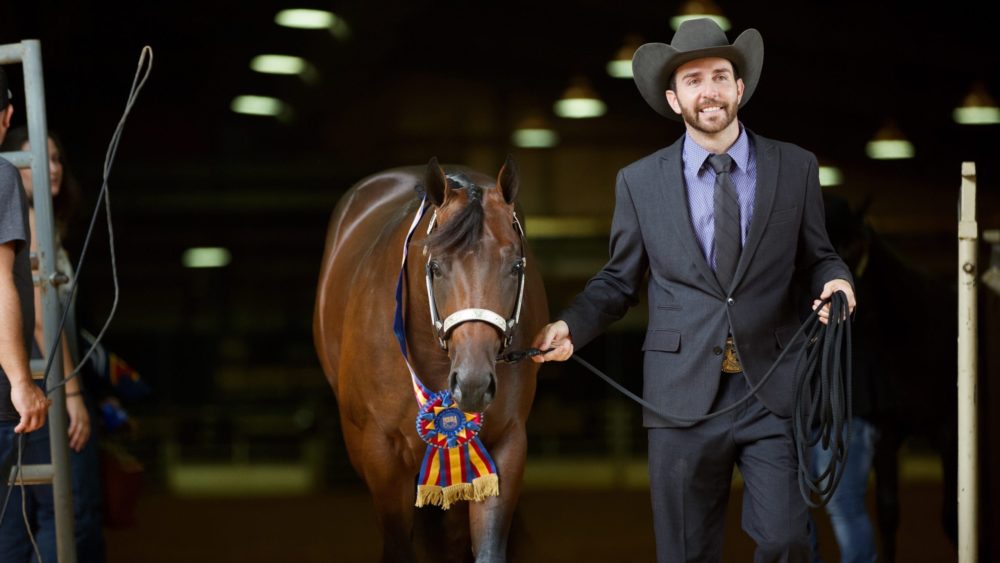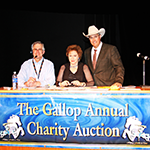There is a saying, “Where focus goes, energy flows.” And while this is often used to inspire humans, it couldn’t be more accurate, in a literal sense, for horses.
Learning how to focus a distracted horse at home is critical to a productive training session. Likewise, learning how to focus a distracted horse at a show is crucial to success.
Like a human toddler, if there are horses at a show who require the most conscious effort to keep them on task, the yearlings take the cake.
Therefore, we decided to speak with Anthony Leier of Leier Performance Horses to get some insider tips on his methods to keep his yearlings focused, which can also translate to working with older horses.
Build Your Bond
Leier says his program relies heavily on establishing a bond with his horses.
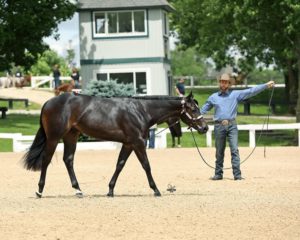
Specifically, the ability to work a horse through distractions is often founded on the animal’s trust and respect for its handler. “I wish there were an easier way to explain this one,” Leier admits, “but the reality is simple: there is no substitute for time and repetition.”
Anthony advises that exhibitors take the time to get to know their horses. “Build a bond with the animal. Understand what bothers them and what works to soothe them.” For example, does your horse respond better to a firm hand? Does your horse respond better to a gentle, soft voice? If you don’t know the answer to these questions, it will likely not be easy to focus or calm them while at a show.
Simply put, there is no substitute for investing the time in getting to know your animal and building a relationship with them. Then, your horse will be more likely to respond to your cues when the time comes.
Expose Your Horse to Distractions
Leier believes it is critical to establish reasonable expectations for your horse. You can’t expect the perfect show partner without giving your horse time to learn what to expect at a show.
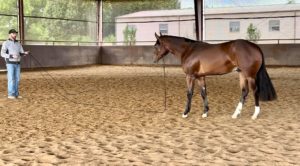 Anthony often takes his yearlings to a show when they aren’t expected to perform so they can tag along for the experience. However, he says this should also be done with older horses that don’t have much show experience.
Anthony often takes his yearlings to a show when they aren’t expected to perform so they can tag along for the experience. However, he says this should also be done with older horses that don’t have much show experience.
“Shows have a lot going on and can be over-stimulating, scary, and new. It is unfair to expect your horse not to be distracted by that if you don’t allow them to experience it and learn what behavior is expected of them.”
Leier advises taking advantage of warm-ups, getting your horse out of the stall and “going for walks” so they can check out the grounds, and allowing them to see the arena before they are expected to show in it.
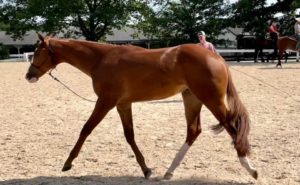
This multiple World and Congress Champion trainer takes it further by having his assistants and clients make noise in the stands and move around on the rail during practices with the yearlings the night before their classes. This provides his babies exposure to the most common distraction in their classes before they are expected to ignore it and keep showing.
“Again, exposure takes time and practice at home. Please don’t allow your horse to experience a common distraction for the first time while they are showing. Give them a chance to see something similar at home, or check that distraction out on the grounds before they have to show with it.”
Change It Up
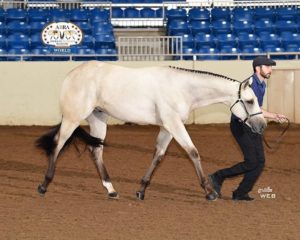
One technique Leier implements for dealing with distractions is changing the routine and keeping things new for his horses. While a structured program is essential, you don’t want to make it monotonous.
This concept also applies to individual distractions. Indeed, if your horse keeps wanting to look at something and isn’t focused on your cues, you have two choices: (1) make them stand there and stare at it, without moving, until they are bored out of their mind, or (2) give them another task to do that takes brain power away from the distraction. Either way, you need to change it to deal with it effectively.
Patience Tying
Anthony firmly believes in having his babies stand tied for a few hours per day, especially before they show. While tying doesn’t seem to have a significant physical impact on his horses, he notices that it calms them down mentally.
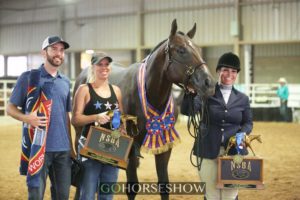
“Tying a horse teaches them to stand and deal with their thoughts.” It can teach stillness for a nervous horse, patience for a young horse, and self-discipline for older horses. It also allows them to sit with themselves without engaging in a fight with their handler.
Leier finds that horses who spend time patience tying tend to be less distracted when waiting at a cone for a pattern, waiting on the rail for the class to fill, or waiting for awards announcements when the class is over.
A patient, disciplined animal is less likely to be distracted when it counts.
Last Resorts
Leier goes to his literal toolbox to help his horses when all else fails.
Leier has observed that, like humans, horses deal with anxiety at shows, and some struggle with distractions more than others. But, he believes that if humans, who are entirely aware of what is going on at a show, can be nervous, we should be empathetic to horses since they are flight animals. This means that their first reaction to a threat is to flee.
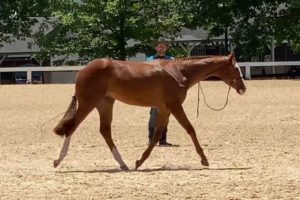
Anthony recommends the all-natural supplement Perfect Prep EQ™ Extreme Calming Paste for horses that need to take the edge off. Perfect Prep EQ™ is not a banned substance, and it is most effective when administered 90 minutes before a class. However, he advises you to consult your veterinarian and your rulebook before administering any calming supplements.
Leier also uses Pomms Ear Plugs for Horses as a “very effective last resort” for nervous and distracted animals. When dealing with yearlings, the earplugs can be a double-edged sword because the animal needs to be able to hear cues in a longe line class from 30ft away. However, when you can go to spur aids and hand placement, ear plugs may be a very effective way of helping settle and focus your horse.


